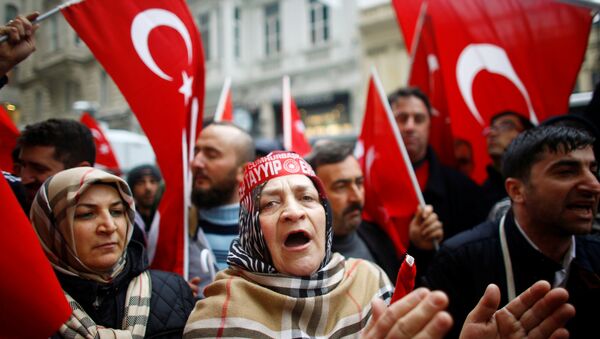On Monday, Turkey sent the Netherlands two diplomatic notes, one that criticized the treatment of Turkish Foreign Minister Mevlut Cavusoglu, who was prevented from meeting with Turks residing in the Netherlands on Saturday after he was not allowed entry over security concerns as well as a second over the "disproportionate" Dutch police response to a gathering that protested his ban. Additionally, Turkish Family and Social Affairs Minister Fatma Betul Sayan Kaya was denied entry to the Turkish consulate in Rotterdam on Saturday.
"There are two upcoming elections. On Wednesday, there are parliamentary elections in the Netherlands. Political parties are struggling [against] each other for the power. There is also a [constitutional] referendum to take place in Turkey. That means both sides, Turkish government and authorities of the Netherlands, are acting with the mindset of the referendum and elections for the domestic consumption," Yilmaz said with regard to the Dutch government’s ban of rallies protesting the actions taken against Turkey.
Yilmaz condemned the actions of Dutch authorities toward Turkish ministers as being undiplomatic, unfriendly and very rude. He stressed that such actions violate the Vienna Convention on Diplomatic and Consular Relations.
"[Dutch] Prime Minister [Mark Rutte] is trying to turn things against [the far-right Dutch Party for Freedom (PVV) under leadership of Geert] Wilders by playing on national concerns of the Dutch. He is using the weapons of Wilders against Wilders … In Turkey, there is also a referendum and Turkish ministers are going there [to the EU] just to make propaganda for AKP [the Justice and Development Party]. And these are the ministers who are working and using the government’s resources for the ‘yes’ [referendum] campaign. So this is also unacceptable," Yilmaz added.
Ankara, in turn, promised reciprocal actions and sanctions against the Netherlands, while Turkish President Recep Tayyip Erdogan named the Dutch authorities' behavior as "Nazism."
Parliamentary elections in the Netherlands are set to be held on March 15. Wilders' PVV, well known for its anti-migrant and anti-Islamic sentiment and for prioritizing national interests, was the front-runner of the election race for weeks. People's Party for Freedom and Democracy (VVD) headed by incumbent Rutte managed to take the lead only in past days.
Ankara has been seeking support for a constitutional amendment among Turks living abroad that would enlarge the powers of the Turkish president over the legislature and judiciary. The Turkish referendum on constitutional changes is scheduled for April 16.



